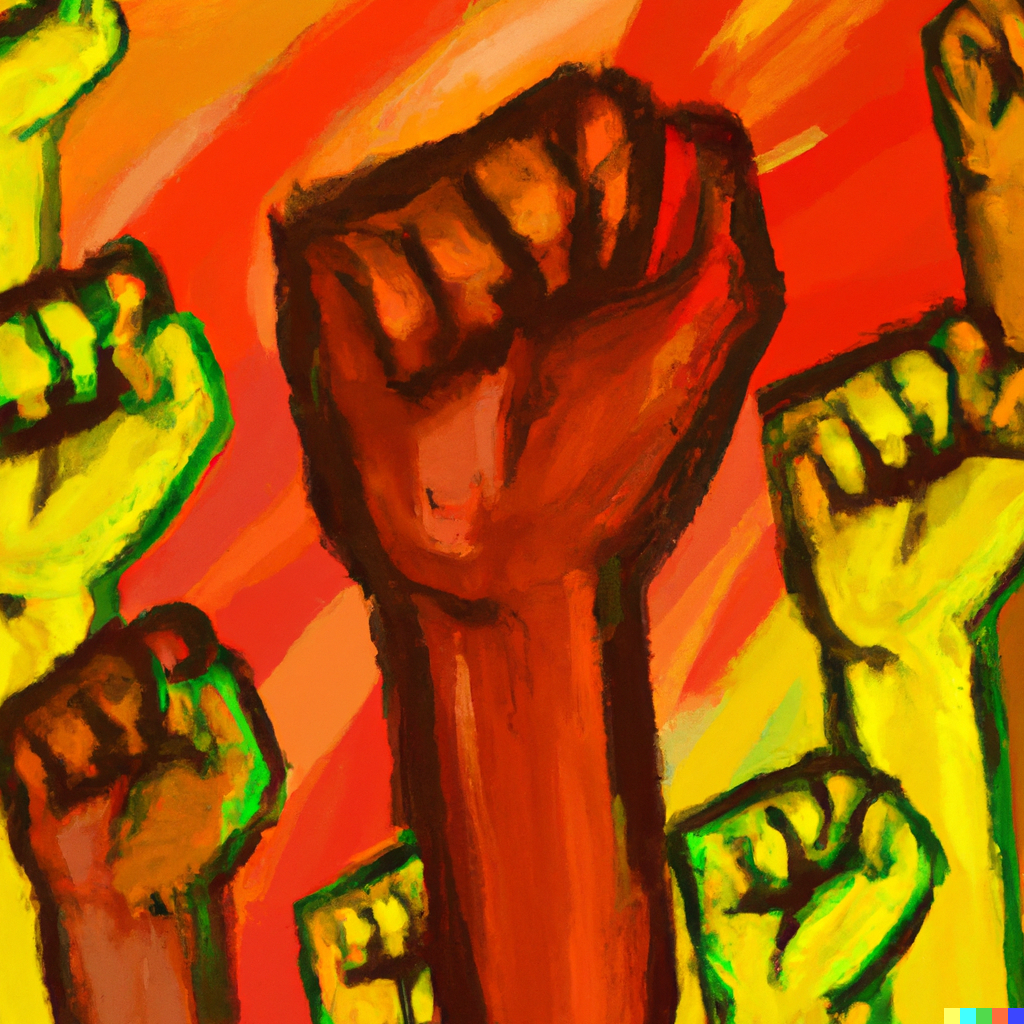
(Image by Trina McLeary, via DALL-E)
What unites people at a community college? With so many people of different ages, backgrounds, and objectives, Palomar can feel somewhat isolating at times. On a typical day, there is not much commotion on campus, and people seem to keep to themselves for the most part.
We refer to them as ‘two-year’ colleges since the idea is generally to get in and out as fast as possible in order to get to the next thing in life. Palomar College is cited by Community College Review as #11 on the list of largest community colleges in California, with an attendance rate of 21,141 to date.
The Porch Talk
So how can such a large and diverse place feel like a community? What if you’re part of an underrepresented minority? Palomar’s Umoja Club shared with me the value of being part of a community and recognizing the people it’s composed of. Umoja, which is Swahili for unity, is a program dedicated to acknowledging and celebrating African American and other cultures.
The club meets once a week to discuss its goals and plan community-building events. They also host a bi-monthly Porch Talk, where students meet to discuss important and relevant issues in an informal setting.
Their April 5th porch talk began with a 30-minute mingling session. A stack of pizzas and breadsticks was delivered to the room. A few students introduced themselves and informed me of the topic for the day: gun violence. Before the main discussion, the group chatted with me about cultural representation at Palomar and its importance.
“I personally don’t think there’s much representation, honestly, in San Marcos campuses in general,” said club president Eric ‘Trey’ Russel. “When I go to OUSD district (Oceanside Unified School District), I’m seeing a lot more brown, and I’m seeing definitely a lot more Hispanic instructors. And I think that’s good for my Hispanic and Latino community because I think that’s something they need to see in the education community for sure, is people who look like them.”
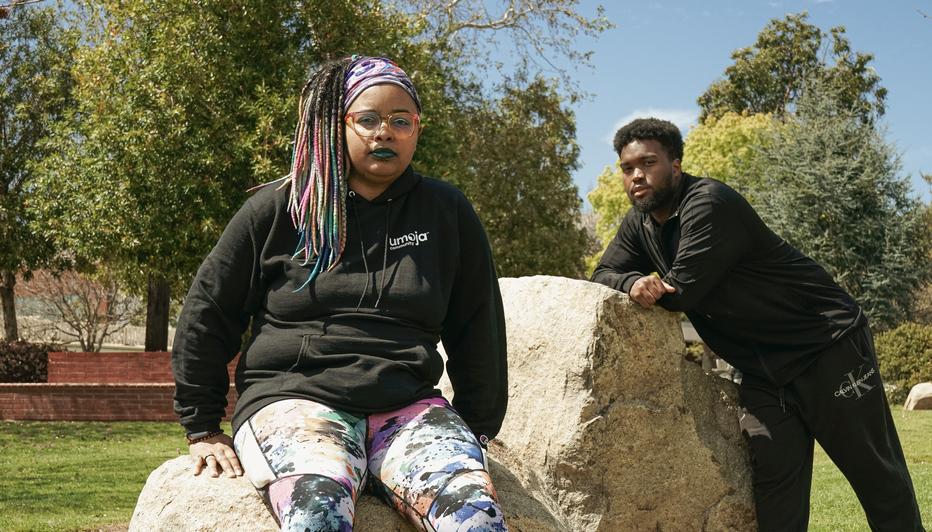
“I personally don’t think there’s much representation, honestly, in San Marcos campuses in general,” said club president Eric ‘Trey’ Russel (r), with council representative Chanti Turner.
At Palomar College, about 46% of students identify as Hispanic, 35% as white, 7% as Asian, and 2% as Black, according to a College Factual Demographics Report. When a group is present in smaller numbers, it can feel particularly difficult to feel recognized. Member Jessica Villagomez said, “A lot of people are losing the origin of their culture because we’re all trying to fit into the, I guess, for lack of a better word, the ‘white norm.’”
Some students feel that cultures and historic events are often taught inaccurately in schools, and with little regard for the people involved. “It annoys me when teachers don’t even think to listen or hear the student’s point of view, especially if they’re part of that culture,” said member Lee Checa-Valdez. “There’s so much about certain things that have happened in the past, especially concerning natives and indigenous people that have been debunked and the truth has been told and they’re still teaching all this like, not true stuff.”
Professor Richard Carr teaches English at Palomar and is also the club’s coordinator. He shared his experience as part of a minority group and discussed the importance of engaging and being a mentor to his students. “I was always the one Black student. In my MFA program, I was the only black male in that program. And I remember thinking, ‘everybody’s gonna look at me as the one that represents Black people in this room’…so I always feel like I’m carrying the weight of the world on my shoulders when I’m in those types of spaces, but I know our students feel the same way.”
Russell described how Professor Carr’s teaching style differs from that of other professors he’s had. “I don’t think it’s hard for him to do what he does… it’s more of a connection thing. It’s kind of like, ‘Oh, they might like these little games.’ And we DO like those little games,” he exclaimed. Everyone chuckled in agreement. “He kind of knows what’s worked best for him as a former Black student, and what’s going to work for his future Black students.”
“A lot of times, us as professors can get comfortable with things, and in order to meet the needs of your students, you have to constantly be able to evolve as an instructor, as a coordinator, right, in these spaces, they’re not stagnant spaces,” said Carr.
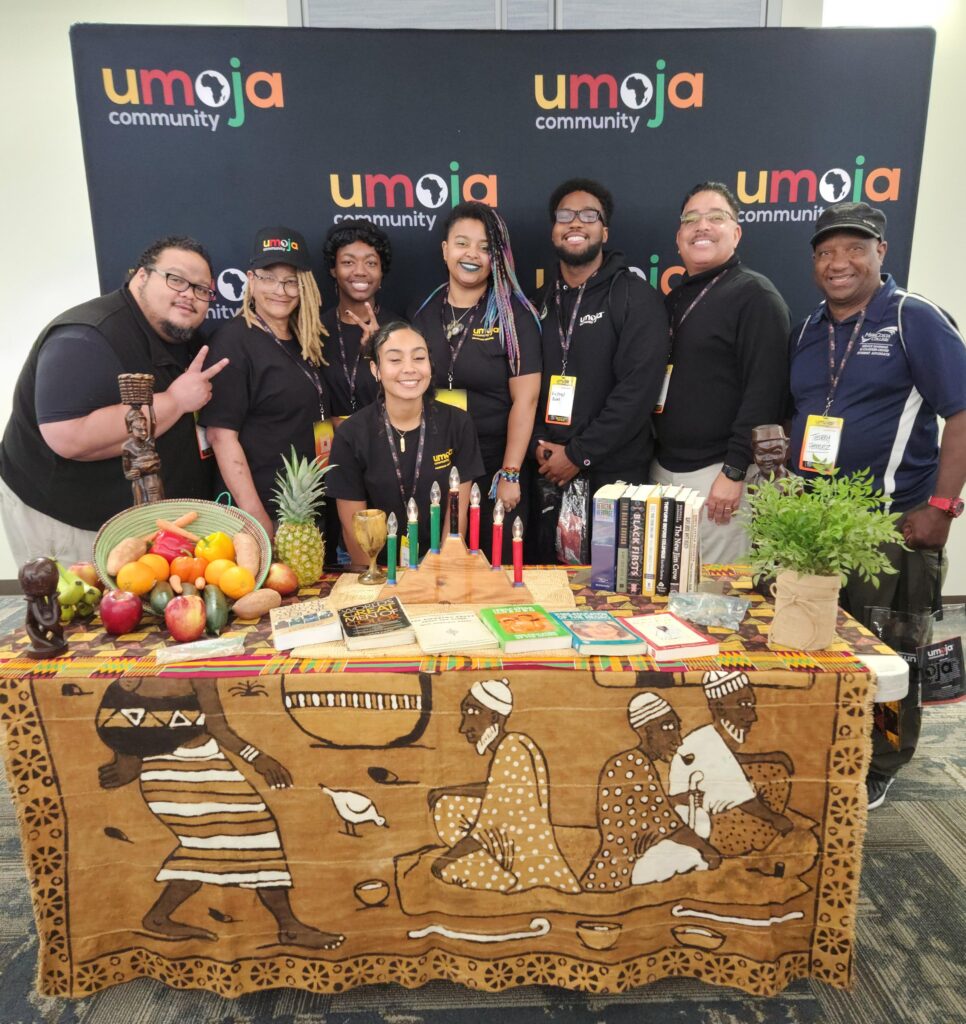
Umoja group. Pictured from left to right: Professor Richard Carr, Diane “Redd” Moore, Lee Checa-Valdez, Janelle Harvey, Chantrelle “Chanti” Turner, Eric “Trey” Russel, Professor Kyle Owens, and Terry Perez at the 2023 Regional Symposia held at Orange Coast College in Costa Mesa, Calif. (Photo by Lee-Checa Valdez)
The Program
Umoja exists beyond Palomar. It’s a statewide community represented by over 70 community colleges, which seeks to promote cultural awareness and enhance the experience of college students. According to San Diego City College, the first Umoja program was established in 1988 at Chabot College in Hayward, Calif., and was known then as the Daraja Project. “Daraja” is Swahili for bridge.
“The point of the program is to build student confidence so they feel like they can advocate for themselves,” said Carr. “We need students to come up and say, ‘yeah, I’m not learning this way. And I need you to really do something like, if you’re going to try to teach me, I need you to make some corrections. To meet me where I’m at. And that takes a lot of cojones, right?”
Since 1988, several colleges have developed similar programs designed to support African American students. In 2007, all of the separate programs unified into one large UMOJA community.
Aside from regular meetings and porch talks, the club also engages in various community service, career-building, and networking activities, such as blood drives and beach cleanups. They recently partnered with Mesa Rim Climbing Gym in San Marcos to host “Black Climb Nights: Climbing for Unity,” which will be a free monthly community event for anyone to get together and connect.
Chauntrell “Chanti” Turner, the club’s council representative, explained that the event will be open not only to Palomar students but students from other campuses as well as anyone who wants to be involved. “We just want to essentially let [students] know that even though you’re not going to be here next semester or you’re transferring that you’re still in this community… and that’s going to be our way to catch up with them and meet up with them if anything after they graduate,” she said.
The club also participated in Palomar’s 2023 Black Student Success Week, a series of skill shops and presentations to help students thrive. Turner, who is studying Art Media Design in hopes of becoming an art therapist, hosted a workshop on the benefits of art therapy. She explained, “It’s a way to convey what you have gone through but without actually talking about it. That’s really important to somebody who has PTSD, or C-PTSD or, you know, some other kind of disorder.”
- “We just want to essentially let [students] know that even though you’re not going to be here next semester or you’re transferring that you’re still in this community,“ said Umoja Club council representative Chanti Turner (r), with club president Eric ’Trey“ Russel. (Photo by Trina McLeary)
- Umoja Club council representative Chanti Turner shows off the back of her hoodie with the words “Umoja community.” (Photo by Trina McLeary)
The workshop also featured an interactive exercise “creating your own emotional monster,” where students choose an emotion from a provided selection and portray it in a drawing, which Turner then analyzes. She says that students are often shocked by how accurately she’s able to assess their feelings from the drawing alone.
On a broader scale, Umoja hosts its annual conference along with several seasonal events for Umoja programs across the regions to network with one another. “This is a chance for students to get together and talk about pressing issues, and how we can make our program better,” said Carr.
This spring, some Umoja students at Palomar got to attend the 2023 Regional Symposia, held at Orange Coast College, which featured workshops and career-planing exercises.
Members of the Umoja club recognize the importance of celebrating and supporting one another. Villagomez, who is in her second semester at Palomar, shared that being a part of the Umoja club has helped her persevere through her classes. “I’m really happy that I’m here and I found my community,” she said.
Russel doesn’t feel a strong sense of community on campus outside of the Umoja club. “But I think that’s just part of being a community college,” he added. “Honestly, everybody’s trying to just get to where they got to be, to get up outta here as fast as possible. I think when you really take your education seriously, it takes a certain level of maturity to be like, ‘Let me go find a community,’ because it’s hard doing this alone.” •
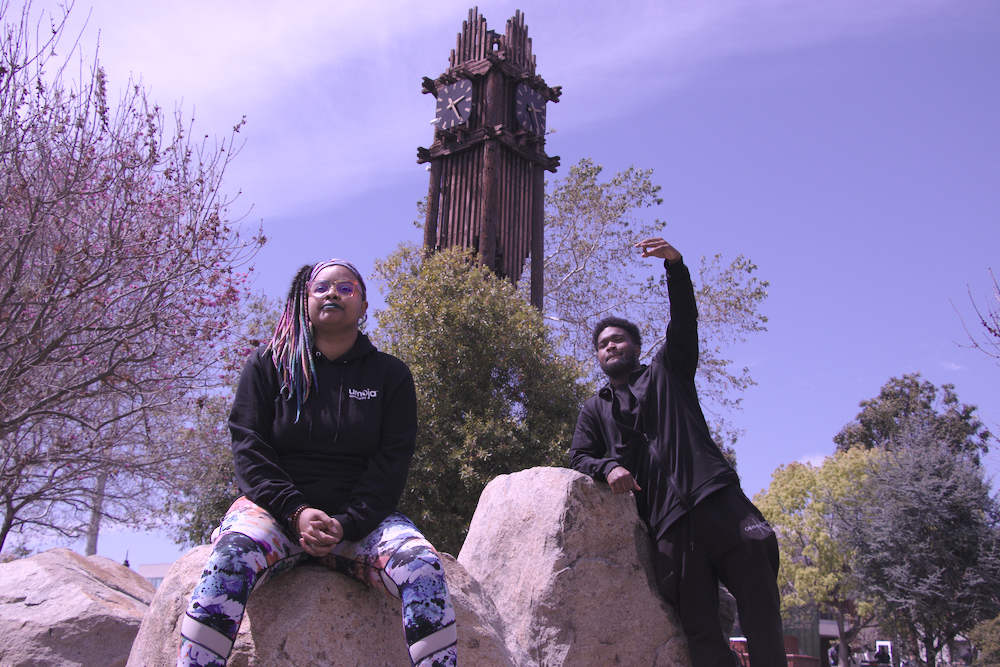
Umoja Club president Eric ’Trey“ Russel (r) and council representative Chanti Turner enjoy the midday sun near Palomar College’s clock tower. (Photo by Trina McLeary)

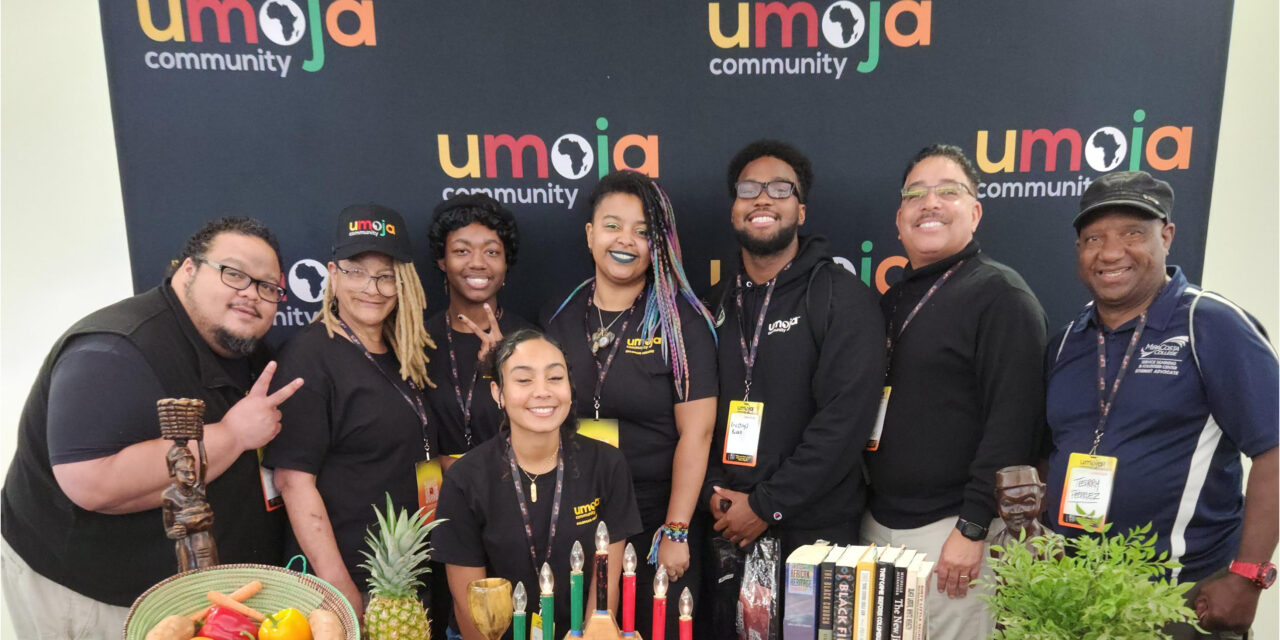
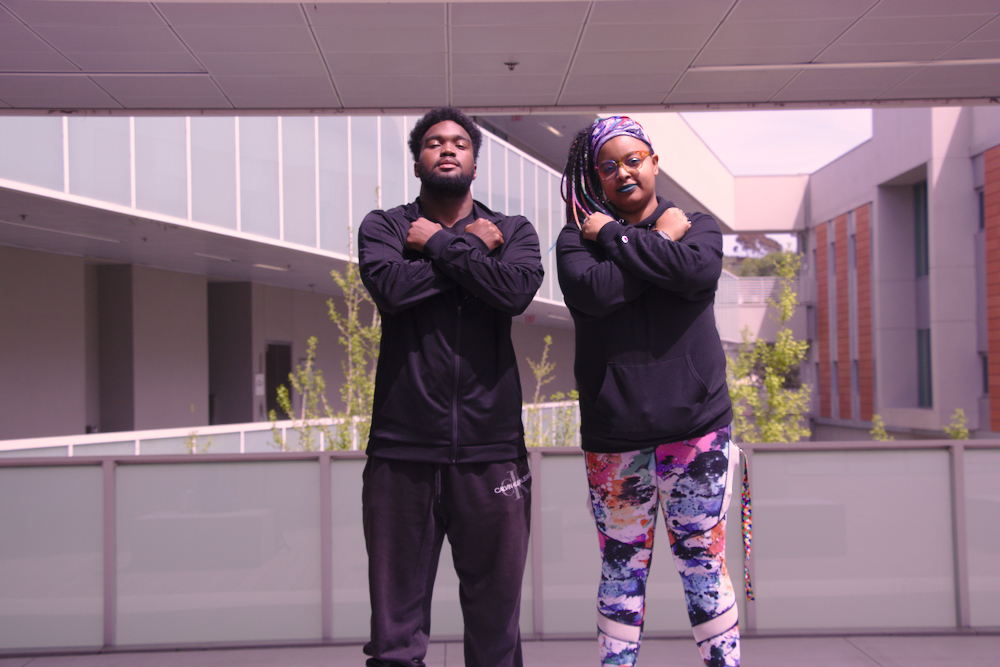
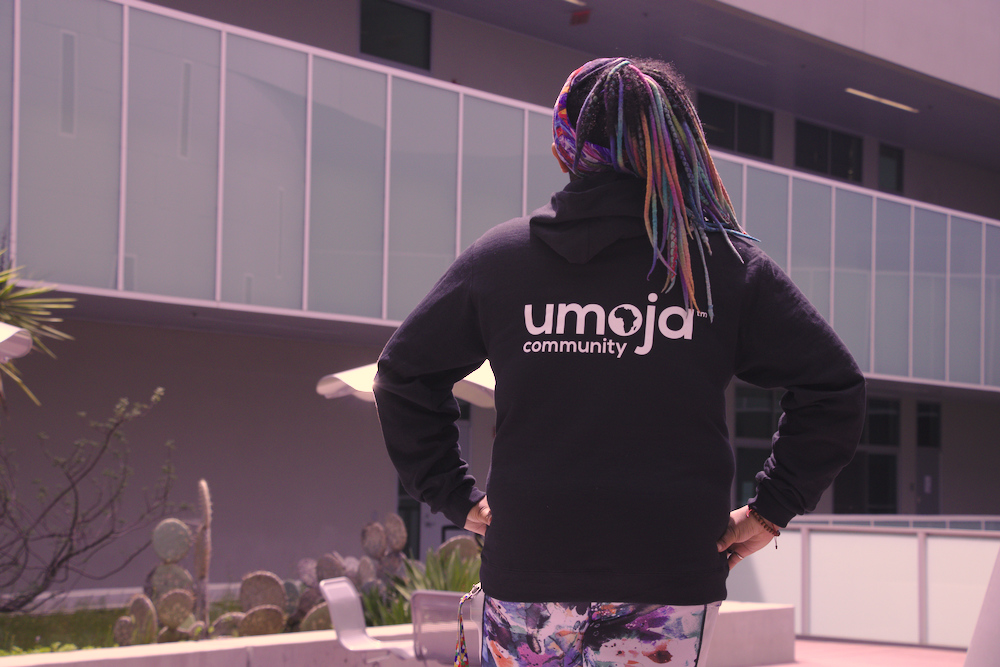
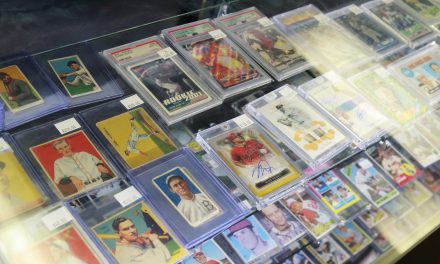
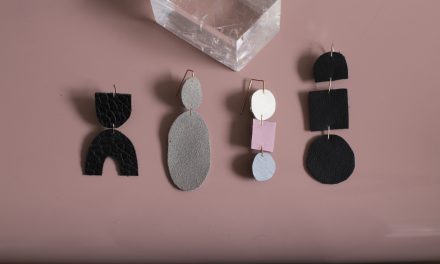

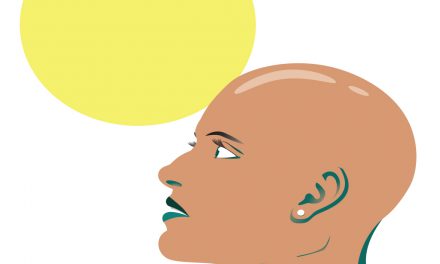
Recent Comments